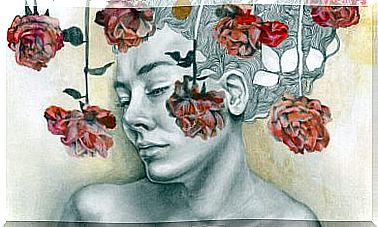Smart People Tend To Be More Insecure

Smart people tend to be more thoughtful, meticulous, hesitant, and insecure in their day-to-day life. However, those profiles that are more arrogant and characterized by personal overvaluation are safe by nature because they do not assess the consequences of their actions, nor do they measure the effect of their words. Furthermore, they are not concerned about the harm they can do to second people.
Often times, it is said that “there is no deeper happiness than that which comes from ignorance . ” Surely we will all agree on this idea, because we will all have found on some occasion that essence so characteristic of human stupidity where we act with complete emotional and rational negligence, without being aware of the effect of certain behaviors.
However, and despite the fact that most of us know how to recognize the “ignorant” , whom he acts with marked pride, presumptuousness and arrogance, a question often arises: why do they continue to have so much power in our most common scenarios? Historian Carlo Maria Cipolla used to say that sometimes we underestimate the large number of stupid people in the world, but to this statement we should add another one… Why has stupidity reached such high levels of power in our society?
Psychologists and sociologists tell us that there is a curious aspect associated with this type of behavioral profile. The stupidest people tend to show high security, are more vehement, more “noisy” and have the ability to influence others through these types of traits.
Intelligent people, for their part, are usually characterized by marked insecurity, high response latency, reflection and even personal discretion. All these dimensions create no impact. Furthermore, we live in a world where insecurity is still seen as a negative characteristic.

Smart people are often underestimated
We still have a somewhat misconception about intelligent people and especially those with very high IQ. We see them as competent men and women, capable of always making the right decisions, or of being highly effective in their daily tasks, responsibilities and obligations.
However, there is a detail that is usually present on many occasions: intelligent people often suffer from social anxiety. They rarely feel fully integrated into a given context: school, university, work… Also, as the psychiatrist and neuroscience doctor Dean Burnett explains, the profile characterized by high intelligence is constantly undervalued.
This is what is known as “impostor syndrome”, a disorder in which the person minimizes their achievements and personal abilities until little by little their self-esteem and self-confidence are undermined. Obviously we cannot generalize, as there will be people with a high IQ who will show high confidence and who will have climbed the peak of success with poise, perseverance and psychological efficiency.
However, the aforementioned pattern is usually very common: intellectually brilliant people tend to have a deeper perception of reality, a reality that they do not always find easy to assimilate, or pleasant or even less trustworthy.

Is insecurity really such a “negative” dimension?
We must admit, personal safety attracts and inspires us. We like that type of person capable of making quick decisions, showing poise and a quick reaction capacity in every circumstance. However … is it really wise and even desirable to always be so “sure” of ourselves?
The answer would be “yes but no”. The key is in the measure, in the balance. To quote neuroscientist Dean Burnett again, one of his best-known books is worth talking about here: “The Idiot Brain.” It explains to us that generally, the most naive or “stupid” people are the ones who usually show the highest level of personal security. They are profiles unable to recognize when something is wrong or to apply analytical and reflective thinking to previously assess the effect of certain decisions, actions or comments.
However, and here comes the strange and worrying thing, “the idiot personality” tends to have greater social success. Managers, senior officials or politicians who show vehemence, security and firmness in their decisions tend to agglutinate what many consider as “leadership capacity” .

Productive insecurity
The insecurity that traps and immobilizes us is not useful. However, the insecurity that indicates something like “stop, be cautious and reflect before deciding” can be of great help as long as, yes, it helps us to make a decision and not to get stuck indefinitely.
Intelligent people usually have great difficulties when it comes to managing this insecurity because, as we have said, they tend to have low self-esteem in addition to some of these dimensions:
- They overanalyze every fact, event, spoken word, gesture, or attitude.
- They present a type of “arborescent” thinking. That is, they go from one idea to another and then to another, until they are eternally engulfed in mental states with no way out.
- They are very logical people and they need “everything to fit”, for everything to make sense. When life sometimes demands that we accept it as it is, with its irrationalities, chaos and strangeness.
Therefore, and to ensure that insecurity does not leave them isolated in the immobility of their sophisticated minds, it is necessary that they learn to tolerate uncertainties, the imperfection of human behavior as well as the lack of logic of many events in this world.
In addition to all this, it is vital that their intelligence moves from that eminently “rational” border , towards that emotional intelligence where they stop underestimating themselves or self-perceive as strange beings, oblivious to a reality that, even if they do not believe it, needs them more than ever to defeat “the virus of human stupidity.”
Images courtesy of Franzesca Dafne









